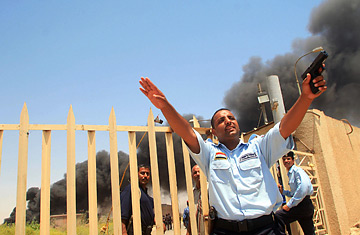
An Iraqi policeman gestures with a gun as fire and smoke rises at an oil facility in Basra, August 4, 2007.
Even as Capitol Hill braces to debate the impact of the U.S. troop surge in Baghdad, the 5,500 British troops stationed in Basra appear to be on their way out. They're already implementing a plan to withdraw their bases from Iraq's second city, consolidating their forces at a single base near the airport pending the hand-over to Iraqi forces scheduled in the fall. But the impending departure of the British on terms less than favorable to their goal of stabilizing Iraq is being seized on by radical Shi'ite militias as a propaganda opportunity. They're escalating their attacks on British forces in order to create the impression that the Brits are retreating under fire, and radical Shi'ite leader Moqtada Sadr has publicly sought to take credit for hounding the occupiers out of Basra.
But Basra was not lost to the militias in battle; it was lost politically. With the British military already overstretched by its commitments in Afghanistan, the role of its small force in Basra has been increasingly limited to protecting itself from attack. Although the British authorities continue to insist that they'll leave only when Iraqi forces are able to guarantee security, the grim reality is that they have no reliable partners in the local government or security forces, which are beset by corruption and heavily infiltrated by Shi'ite militias. Their departure will likely escalate a violent power struggle between rival Shi'ite factions that is already under way.
Last Monday, the governor of neighboring Muthana, one of three southern provinces already turned over to Iraqi control by the British, was assassinated in a bombing that many suspect was carried by out by Sadr's Mahdi Army militia — the slain governor had been affiliated with the rival Supreme Iraq Islamic Council and its Badr Corps militia. A similar killing occurred last week.
The intra-Shi'ite political violence in Basra highlights the complexity of the situation in Iraq. It's not even clear that the Basra-based affiliates of the Mahdi Army and the Badr Brigades are actually taking orders from their nominal national leadership. Chaos in Iraq's key port city and the gateway to its major oil fields is not the only consequence of the British departure feared by Western officials, however. Some fear it may serve as an invitation for Iran to further expand its influence. "Will the Iranians fill the vacuum?" asked the Western diplomat, who spoke on condition of anonymity. "I think they may try."
Curiously enough, Moqtada Sadr appeared to express a similar concern over potential Iranian influence in an interview with Britain's Independent newspaper, although he was confident that problems could be resolved. Iran, until now, has extended its influence by offering support to a number of different Iraqi Shi'ite factions, some of which are at each other's throats in Basra. Indeed, while Sadr may be more hostile to the U.S. and its allies than Supreme Council leader Abdulaziz al-Hakim has been, Hakim has also long been closer to Tehran than Sadr has been — although the latter has also been receiving Iranian support in recent years. And then there's a third element, in the estimated 18,000 fighters loyal to the Shi'ite Fadhila party, which holds the governor's seat in in Basra — he was recently voted out of office by the provincial council (divided roughly between Fadhila and Supreme Council legislators), but has refused to surrender his position. And, according to U.S. estimates, he won't be easily dislodged. So, the (armed) politics of Basra may have become so complex that even if Iran were ever to try and exert control here, they'd likely find the city just as ungovernable as the British did.
